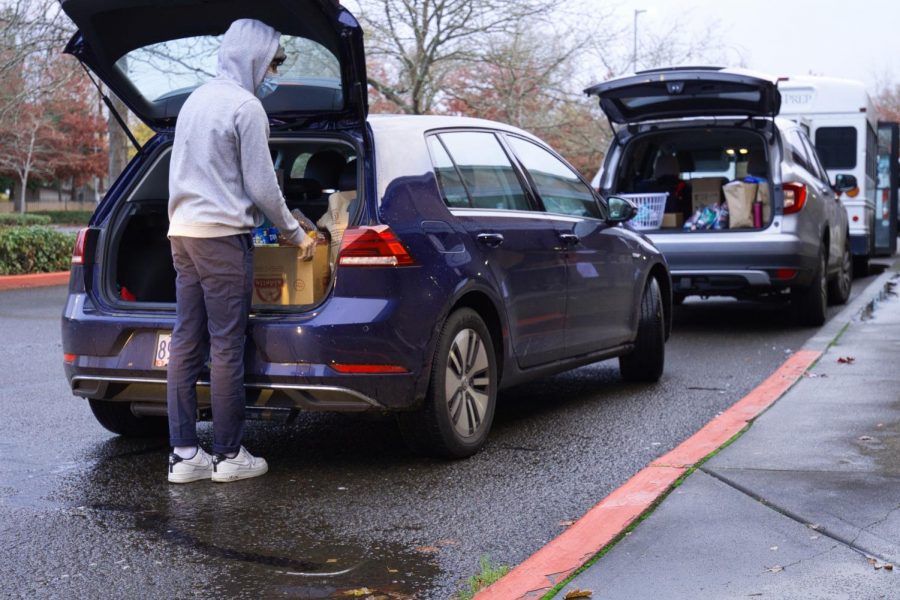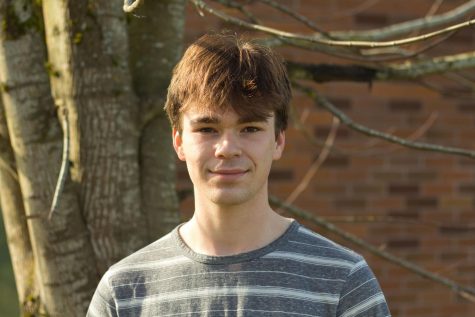“You Can Help”: Amid Pandemic, Service Leaders Aim To Bring Volunteer Opportunities to the Community
During one food drive this year, the La Salle community donated culturally-appropriate food to a community of migrant workers. “We filled an entire La Salle minibus full of avocados and tomatoes and jalapeños and onions and peppers,” Ms. Maher said.
March 17, 2021
When Director of Service Ms. Sarah Maher joined La Salle in the fall of 2019, she was looking forward to helping the La Salle community get their “hands dirty” and offering “as many opportunities as possible to be physically present,” she said. However, this hope was diminished with the start of the COVID-19 pandemic in March of 2020.
Community service is an integral part of life to many at La Salle, but the COVID-19 pandemic has greatly impeded the ability to serve others.
With gatherings and close human interaction heavily discouraged, in-person service was essentially canceled. La Salle responded to the pandemic by cutting students’ service requirements in half last spring and has not required service at all this year.
“It’s a shame,” Ms. Maher said. “When students are introduced to service — physical, in-person service — it’s the opportunity for complete change.”
She encourages students to “get to know everybody [at the service opportunities because] that relationship piece, that physical connection, can truly shift compassion,” Ms. Maher said, “It can shift understanding,” and “the lack of that [opportunity] is horrible.”
Ms. Maher said that, despite not being able to capitalize on her initial plans of physical service, she kept with her “pledge to help bring about [an] understanding of justice.”
“Since we can’t have that hands-on learning opportunity, I have tried to partner as much as I could with teachers and curriculum to have social justice webinars with people who are doing the work in this city,” Ms. Maher said.
To facilitate these webinars, Ms. Maher has worked with different local organizations, such as Catholic Charities of Oregon and Don’t Shoot PDX, “to get as much outside opinion into our school, even if it’s virtual, so that we can have access to better understand the injustice that we see and hear about,” she said. Webinar topics have included the pandemic’s effect on the incarcerated and migrant workers, as well as Black excellence.
Ms. Maher encourages the community to take this time of relative inactivity to “open your eyes and ears to what’s happening in our city” and learn how to help by attending La Salle’s webinars.
After each webinar, Ms. Maher then plans a related “actionable item.”
In response to the incarceration webinar, Ms. Maher initiated a drive for the Insight Alliance to gather Christmas gifts for kids with incarcerated parents. After the webinar about migrant workers and how COVID-19 has impacted them, there was a drive for fresh, culturally appropriate food for migrant worker communities. Ms. Maher is currently working to arrange a service opportunity to accompany the recent webinar about Black excellence.
The disruption from the pandemic has “really changed what service means,” said MaryGrace Mott, senior and officer of service. “[COVID-19 has] changed [service] to be more than just going out and doing something.”
Before the pandemic, Mott would spend every Friday night volunteering at Rahab’s Sisters, a local women’s shelter. After the shelter greatly decreased volunteer opportunities due to COVID-19, Mott has had to find “new and intuitive ways to still do what I love,” she said.
Mott stepped into her role as Officer of Service this school year. Although initially unsure as to what she could do with her role during a pandemic, she quickly learned that “you have to adapt,” she said. Unable to do hands-on service, Mott found new ways to serve the community.
Mott has been a part of the planning for the social justice webinars offered to the La Salle community, coordinated monthly drives for Lot Whitcomb — a local elementary school — and in her own local community, and has helped keep a “blessing box” stocked with necessities such as food, diapers, and sanitary products for those in need.
This year, Mott’s goal is to “make [service] an opportunity” and “something that’s not an obligation, but an experience we can learn from,” she said.
Both Mott and Ms. Maher have seen a higher than normal level of participation with the drives this year. For each of the Lot Whitcomb drives, Ms. Maher “almost always [has] to pull out either the 12 passenger van or the minibus” to transport the donated food. “This community is very very giving,” she said.
In response to the community’s donations, Mott said, “it makes me proud to know that service is still happening — even in the middle of a pandemic.”
Another important part of service for the La Salle community has been the service immersion trips. With COVID-19 affecting nearly all service opportunities, the immersion trips followed the rest of the world in being held digitally.
The annual De La Salle Blackfeet immersion trip “went really well,” Ms. Maher said. For this virtual immersion program, 13 La Salle students worked digitally with children living on the reservation.
“We were in their classrooms from 8 a.m. to 3 p.m.,” Ms. Maher said.
Ms. Maher is also looking forward to the El Otro Lado immersion trip that usually takes place at the border. This is set to take place on Zoom, too, and there are currently 10 students signed up to participate.
Ms. Maher intends to continue utilizing technology for virtual-learning opportunities in the future, even when in-person opportunities are back. Virtual service opportunities have enabled the La Salle community to work with others on a more widespread level. For example, Brother Nick Gonzalez from Napa, California attended the webinar about migrant workers and Ms. Maher’s friend Madeline Hodapp, who is a youth-support program manager in Minneapolis, joined the Black excellence webinar.
“Having people at your fingertips very, very easily is very cool,” Ms. Maher said.
As the pandemic continues, so does the need for service. Ms. Maher urges the community to “try your best to be other-directed, and when you see something or hear something that doesn’t make sense, always try to get to the root cause of it,” she said.
For those who are interested in serving their community but struggling to find a place to start, Mott said, “find [a cause that] you’re passionate about and pursue it.”





